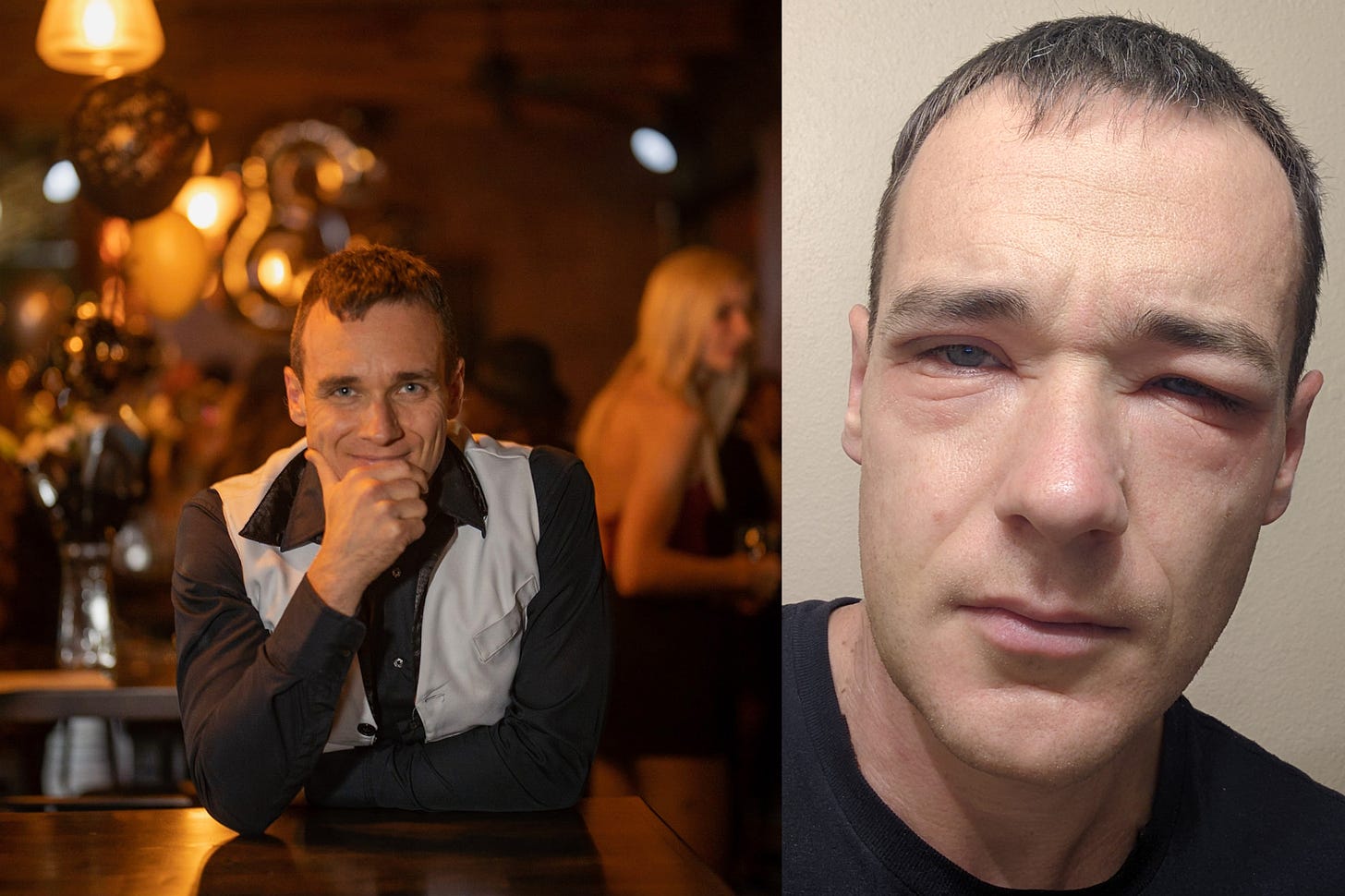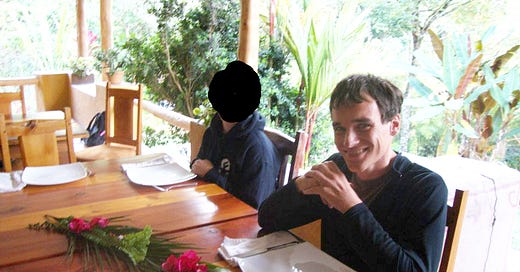The toilet bowls filled with crimson blood and black clots were sickening.
The smell was worse. In 2004, my perpetually tortured insides issued a fart reeking of road kill and sulfur amid a basketball game’s cheering throngs. The half-digested food in my gut mixed with my colon’s open wounds to produce a stench for the ages. It permeated through the bleachers, nauseating people. Several backed away from me in disgust.
I’m telling you this to explain what may seem inexplicable — my 2013 decision to forgo food for 26 days and drink only water under medical supervision.
It was a good decision that furthered my victory over the autoimmune disease colitis, which I’d already learned to keep in remission through short fasts and a minimal diet of fruit and leafy vegetables. After the 26-day fast my digestive system worked better and I could eat more foods, though not the variety most people do.
But this is not a love song for fasting. It deserves one, and I could weave a compelling case for its medical benefits. I might tell you it’s a hedonic reset rendering simple food and pleasures the height of enjoyment. Yes, fasting teaches us to endure discomfort and persevere. Bla bla bla.
Many people have told that tale and I have little to add.
Instead, I want to tell you something that occurred to me months later, a slap in the face that changed the way I approach my life.
My Embarrassing List
I’m a high-functioning broken person.
I’m reluctant even to give you the full list of what’s wrong with me because I wouldn’t believe someone claiming such a list. I’d assume they must be a hypochondriac or a liar. The fact that I’m athletically active and not terribly overweight also gives people the false impression of health. I’ll just give you the highlight reel.

Andrew’s (Partial) Litany of Health Problems:
Colitis (in remission since 2006)
Numerous digestive problems and food sensitivities.
Obesity (kept at bay)
Raynaud's phenomenon
Lifelong sleep/insomnia problems
Unidentified allergies causing my face to swell, large blood blisters to appear in my mouth, and my body to be covered by an itchy inflamed rash that a half dozen allergists and dermatologists have failed to pin down.
A weird, perhaps autoimmune-related condition that damaged my gums, requiring several painful surgeries.
Sometimes I feel half my life has been spent struggling with health problems. Actually, that’s probably accurate. Managing symptoms, accommodating dysfunction, and searching for fixes and workarounds absorb a huge mindshare. It’s a neverending fight.
The Finished State Health Delusion
But the real problem is the stupid lie I subconsciously told myself for years: “When I finally try this new fix/treatment/action, I’ll overcome X, and then my life can start and I’ll be happy.”
Without planning to I’d spent years questing after “a finished state” of health. I assumed there was a thing called optimal that could be achieved, and after getting there I could start the other things. The things I really wanted. I could live in the moment instead of for some future date. I could be happy.
But several months after my fast — which I’d built up in my head to be a cure-all —I realized the significant improvements it afforded were incomplete. I was still juggling numerous health problems and my digestive system was far from perfect.
I lay in bed one night considering the painful, swollen blood blisters that appeared on my tongue a few hours before, though I’d eaten no unusual foods. I began doing what I’d always done — planning to fix myself. I considered experiments I could run and what foods or other exposures might be causing the blood blisters.
And then, out of nowhere, it hit me: I’ll never escape my diseases. Not all of them. Not permanently. And new ones will crop up as I age. I will never win this war; at best I’ll hold the line.
A yawning chasm seemed to open as I considered the futility of it all, and how much life I’d wasted trying to get to a place where I could start living. What the hell was I doing?
This body of mine is dying every day. What does it matter if it has blood blisters and skin rashes and a swollen face twice or a thousand times before it gets put in the ground? Is this really what I want to give half my attention to? What is this life even for? Am I meant to be a half-time worrier, a health custodian of a sinking ship?
Everyone Is a Life Completionist
Perhaps my finished state health delusion is unique to me, but everyone but the sage suffers from completionism.
It goes like this: “I will be happy/begin to live after I graduate, get the job, lose that weight, earn that raise, get married, become disciplined, become rich, retire, buy that car, have some kids, go on vacation, launch my company, earn my peers’ respect, publish that book,” or whatever it is for you.
As you achieve these milestones there’s always another waiting in the wings. In the pursuit, we become as social scientist John Gardner put it, “accomplished fugitives from ourselves.”
Live Now, Before Your Life Is Over
When we put off attending to this moment, spiritual meaning, and the most important things until after our next achievement, we put them off forever. Completion never comes. We are ever half-carved masterpieces.
All we can do is ask: how can I live this next day, this next hour, as a sane person. How can I live with virtue?
As the philosopher Seneca said:
“Putting things off is the biggest waste of life: it snatches away each day as it comes, and denies us the present by promising the future. The greatest obstacle to living is expectancy, which hangs upon tomorrow and loses today. You are arranging what lies in Fortune’s control, and abandoning what lies in yours.”
The health balancing act I’ve taken up since my revelation isn’t straightforward. One can’t neglect the flesh entirely, my flesh least of all. But my forever goal is prying mindshare and precious time away from body maintenance. When the flesh inevitably rebels I merely grit my teeth and do the best I can without making grand plans for conquest and victory over my maladies. I keep my eyes on the goal and death before me as a reminder.
That may not sound like much, but it’s enough. It allows me to live in an entirely different world with different values and a different mindset.
I try to remind myself what Seneca asked: “What are you looking at? To what goal are you straining? The whole future lies in uncertainty: live immediately.”
Thanks for reading Socratic State of Mind.
If you liked this article, please like and share it, which helps more readers find my work.






Thank you very much for your astonishing testimony. The idea of "tomorrow being better" is okay but not very helpful esp when we get caught up in its entanglement. I agree with you 100% and strive for the same. Life is in the now. Def important to have goals / aspirations for the future, i think we all get it, but what we don’t get is the problem you so eloquently reveal: fixating on them exclusively. And so it is no wonder I am lead to feelings of dissatisfaction and missed appreciation for the very present. TY Andrew for sharing your heart and for helping me change.
This has found me in the right state of mind, thanks for sharing this!